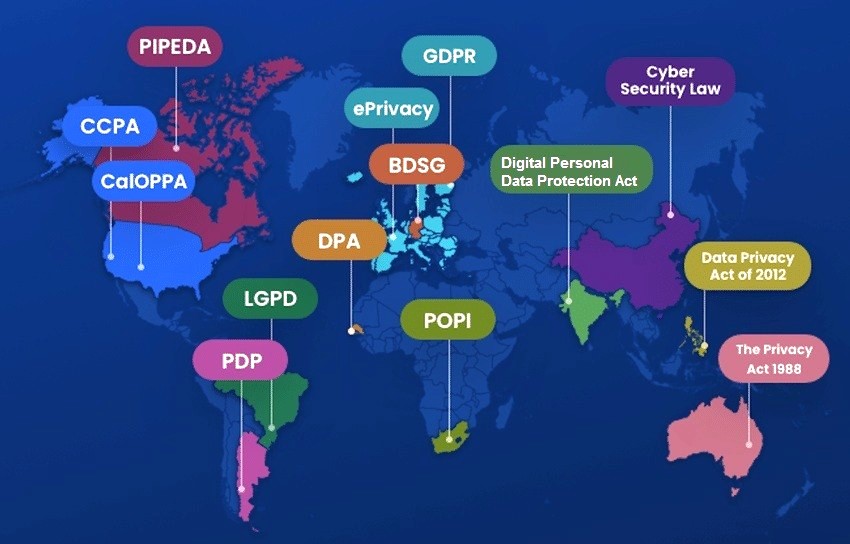Author: Fred Agyemang
In today’s digital age, data is a valuable asset for organizations, but handling it comes with increasing responsibilities due to stringent data privacy regulations worldwide. Laws such as the General Data Protection Regulation (GDPR) in the European Union, the California Consumer Privacy Act (CCPA) in the U.S., and similar frameworks across the globe are designed to protect individuals’ privacy rights. As businesses collect, store, and process vast amounts of personal information, Governance, Risk Management, and Compliance (GRC) professionals face growing challenges to ensure compliance with diverse and evolving regulations.
This blog explores the complexities of global data privacy compliance and provides insights on how GRC professionals can navigate these challenges effectively.
The Growing Relevance of Data Privacy Regulations
Over the past decade, numerous data breaches and the misuse of personal information have raised global concerns about data privacy. Governments are responding by enacting stricter regulations aimed at giving individuals more control over their personal data.
GDPR (General Data Protection Regulation): Introduced in 2018, GDPR remains one of the most comprehensive data privacy regulations, emphasizing transparency, accountability, and individual rights. Its enforcement applies to businesses inside and outside the EU that handle data from EU citizens, making it a global standard for privacy regulations.
CCPA (California Consumer Privacy Act): Enacted in 2020, the CCPA is one of the strongest privacy laws in the U.S., granting California residents the right to know how their data is collected and used, as well as the ability to request its deletion or opt out of data sales.
Global Expansion of Privacy Laws: Countries such as Brazil, India, Canada, and Australia are adopting their own privacy regulations, each with unique requirements. Brazil’s General Data Protection Law (LGPD) and India’s upcoming Personal Data Protection Bill echo GDPR in several aspects, yet each regulation presents distinct challenges for global businesses.
Complexities in Global Data Privacy Compliance
For businesses operating internationally, navigating various privacy regulations is a daunting task. Some of the primary challenges include:
-
Diverse Regulatory Requirements:
Different regions have unique compliance mandates. For instance, GDPR emphasizes data minimization and explicit consent, while the CCPA focuses on data sales opt-out rights. Tailoring compliance efforts to meet varying standards is necessary for multinational companies.
-
Cross-Border Data Transfers:
Regulations like GDPR impose strict guidelines on transferring personal data outside the EU, requiring organizations to ensure that adequate protections are in place in the recipient country. Organizations often need to use tools like Standard Contractual Clauses (SCCs) to maintain compliance.
-
Data Subject Rights:
Global privacy regulations grant individuals rights such as data access, deletion, and correction. Organizations must implement mechanisms to respond to these requests promptly, especially when handling data from multiple jurisdictions.
-
Varying Enforcement and Penalties:
Penalties for non-compliance vary across regions. GDPR is known for its substantial fines, while the CCPA allows for consumer lawsuits. GRC professionals must account for these differing enforcement mechanisms when assessing risks.
-
Emerging Privacy Laws:
As new regulations continue to emerge, businesses must stay updated on regulatory changes. Adapting quickly to these evolving laws is crucial for maintaining compliance.
The Role of GRC in Navigating Data Privacy Compliance
For organizations to succeed in managing data privacy, GRC professionals play a critical role. They help build a structured framework to ensure compliance with regulatory standards while managing associated risks.
-
Governance:
GRC experts establish clear decision-making structures for data privacy, defining roles, policies, and internal controls to oversee compliance across the organization.
-
Risk Management:
Regular risk assessments help organizations prioritize compliance efforts, identify vulnerabilities, and mitigate potential threats to data privacy. Risk-based approaches enable organizations to allocate resources efficiently.
-
Compliance Monitoring and Reporting:
Continuous monitoring and reporting are key to maintaining compliance. GRC teams can leverage automation tools to track compliance in real time and promptly address any issues.
-
Training and Awareness:
Building a privacy-centric culture is essential for ensuring compliance at all levels of the organization. GRC teams should lead employee training initiatives to promote awareness of data privacy policies.
Best Practices for Global Data Privacy Compliance
-
Develop a Privacy Program:
Implement a robust framework that addresses both regulatory and operational requirements.
-
Leverage Technology:
Use automated tools for compliance tracking, data mapping, and reporting.
-
Stay Informed:
Keep up with regulatory changes and regularly update privacy practices.
-
Adopt a Risk-Based Approach:
Focus on high-risk areas to prioritize compliance efforts.
Conclusion
Navigating the complexities of global data privacy regulations is not just a challenge; it’s a critical necessity for modern organizations striving to protect sensitive information and maintain consumer trust. GRC professionals are at the forefront of this effort, ensuring compliance and risk management while fostering a culture of data privacy awareness throughout the organization. By implementing robust privacy programs, leveraging technology for compliance tracking, and staying informed about regulatory changes, businesses can effectively adapt to evolving laws and minimize risks. Ultimately, a proactive approach to data privacy not only safeguards personal information but also enhances the organization’s reputation in an increasingly privacy-conscious world.





